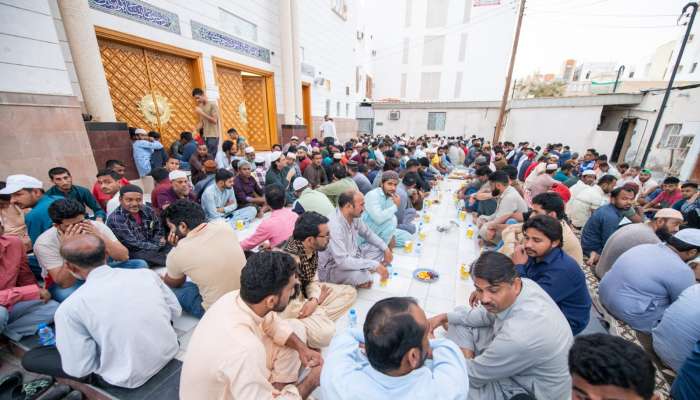
Muscat: As Oman welcomed the onset of the holy month of Ramadan on Tuesday, countless fasting Muslims were observed throughout the Sultanate partaking in the Iftar meal, breaking their fasts in unison.
Ramadan, the ninth month of the Islamic calendar, is a time revered by over one billion Muslims worldwide, who dedicate themselves to fasting and engaging in charitable deeds, known as Zakat.
Throughout Ramadan, fasting and acts of charity are incumbent upon those Muslims who are able. Fasting from dawn to dusk symbolises spiritual purification, drawing individuals closer to the divine while fostering empathy for the plight of others.
The fasting period calls for self-discipline and sacrifice, prompting Muslims to contemplate and empathise with the less fortunate. Generosity and charitable endeavours are encouraged, with the community actively engaging in philanthropy.
During this time, a significant portion of charitable giving is directed towards assisting thousands of Palestinians in the strife-ridden Gaza Strip, aiming to alleviate their suffering.
A prevalent form of charity during Ramadan is the distribution of Iftar meals, which are provided to those unable to afford sustenance or lacking the means to prepare their own meals.
Iftar distribution is a widespread practice in Oman, with mosques, charities, and community organisations hosting events where volunteers prepare and distribute meals.
This act of benevolence not only addresses hunger but also embodies compassion and solidarity. It allows Muslims to express gratitude for their blessings by sharing them with others and fosters a sense of communal unity.
On the first day of Ramadan on Tuesday, numerous mosques, individuals, and charity organisations initiated Iftar distributions, with reports indicating a substantial number of fasting Muslim workers receiving meals in industrial camps in Ghala, Azaiba, and Rusayl, besides in densely populated areas of Ruwi, Wadi Kabir, and Ghubrah
Mass Iftars
While larger mosque-hosted mass Iftars have been discontinued since the pandemic, prominent community organisations and individuals continue to organise mass Iftar gatherings.
One of the largest such events is organised by the Hyderabadi community and the Indian Social Club Deccani Wing.
A senior representative of the wing stated that this year's anticipated mass Iftar gathering, likely to be attended by nearly 4,000 fasting Muslims, will be held at the Clock Tower in the Central Business District on March 22.
Furthermore, the Kerala Muslim Cultural Centre (KMCC), a leading organisation in Muscat, will host a mass Iftar gathering later this month, complemented by the distribution of Iftar donation boxes at various mosques.
Iftar serves as a manifestation of compassion and generosity, enabling Muslims to give back to their community while fostering a sense of unity during the sacred month. This cherished tradition continues to bring solace and aid to countless individuals in need, perpetuating its legacy for generations to come.